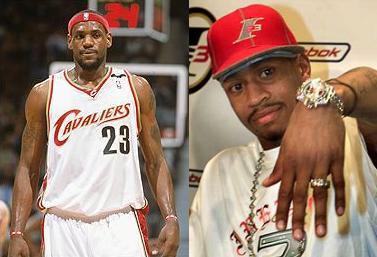 Rick Maese, a columnist for the Baltimore Sun, has an extensive piece today on the NBA Draft (which will be held tomorrow) and how the new elevated age floor may reflect dimminishing player autonomy and underlying issues of race and culture ("NBA Draft Doesn't Get Any Better with Age," Baltimore Sun, June 27, 2006). Maese interviews me for his column, and cites my law article, The Reckless Pursuit of Dominion: A Situational Analysis of the NBA and Diminishing Player Autonomy, 8 University of Pennsylvania Journal of Labor & Emloyment Law
Rick Maese, a columnist for the Baltimore Sun, has an extensive piece today on the NBA Draft (which will be held tomorrow) and how the new elevated age floor may reflect dimminishing player autonomy and underlying issues of race and culture ("NBA Draft Doesn't Get Any Better with Age," Baltimore Sun, June 27, 2006). Maese interviews me for his column, and cites my law article, The Reckless Pursuit of Dominion: A Situational Analysis of the NBA and Diminishing Player Autonomy, 8 University of Pennsylvania Journal of Labor & Emloyment Law
Here is an excerpt from Maese's column:
The dress code was silly, but this age-restriction rule is more absurd.During the interview, I made one other point and it concerned David Stern. I noted that Stern is doing what any good commissioner is supposed to be doing: he's trying to maximize revenue for the league by appealing to fans' wants. So when we talk about the NBA pushing for a dress code and age limits, we're most likely talking about the league responding to what it perceives as in its best financial interests--a form of business behavior which, in and of itself, presents nothing nefarious."Just compare it to other sports," says Michael McCann, a law professor at Mississippi College School of Law. "It begs the question, why do we have this in certain sports but not all of them? Why not for golf, tennis, baseball, hockey, any of these sports?"
League officials believe the new rule will improve the quality of play, but excluding 18-year-olds is just another example of the NBA exerting control over its players. But there's no justifiable reason for an age restriction. I happen to like the idea of an 18-year-old choosing to play college ball, but I recognize that it's not always in the best interest of the player. And I also realize that it shouldn't be solely Stern's decision to make.
McCann is vested in the topic. He was a part of Maurice Clarett's legal team when the football player unsuccessfully tried to challenge the NFL's age-restriction rule two years ago.
"Generally speaking, people ... go to college, we mature and we look back at it all as a good life experience," he says. "There's this empirical view that people who go to college do better in life. But we can't mistake the experiences of athletes with the experience that the rest of us have. It's a radically different world. There's a disconnect that we must recognize.
"You also wonder if there's a race issue," he continued. "This all goes to an underlying stereotype of what we think about urban African-American men. There may be a preconceived stereotype that they need to be in school. The facts, though, at least for basketball players, actually suggest the opposite. School isn't necessarily the best answer for everybody."
Before we get to that, you must first accept that this is, in fact, a black-white issue, as uncomfortable as that may seem. Of the 46 prep players who've been drafted since 1995, only one was white. So it's not hard to make a case that the age-restriction rule specifically targets 18-year-old black men.The NBA sold the public on the rule based on the idea that these young athletes would be better served by at least one year of college seasoning - a preposterous notion from the beginning.
McCann studied American players over the past 15 years. He found that 41 percent of NBA players attended college for four years; the percentage of NBA players who attended college for four years and were later also arrested for some sort of misconduct was much higher - 57 percent.
Among those who skipped college, the number of arrests was disproportionately low - 8 percent of the players in the study did not attend college, but only 5 percent of those arrested skipped school.
So who exactly is more mature and equipped to handle the real world?
And who exactly is served by these age restrictions? Not the pro teams. Not the college teams. And certainly not the players. The only guess I can muster is the fan, the guy who can afford tickets and expensive merchandise, yet has trouble identifying with a culture, an athlete and a lifestyle to which he can't relate.
But that behavior only begs a question: Why do fans want a dress code and why do they want age limits? What do those fan desires say about them, about us? And at what point do stop deferring to "business reasons" and start asking the harder, underlying questions?
Update: Dick Vitale--previously the most ardent critic of high schoolers jumping straight to the NBA--has done a 180 and now believes that high schoolers should be able to enter the NBA. Wow, I'm almost speechless, although in fairness, he did have some reservations about the blanket, absolute age prohibition back in April 2005.





0 comments:
Post a Comment